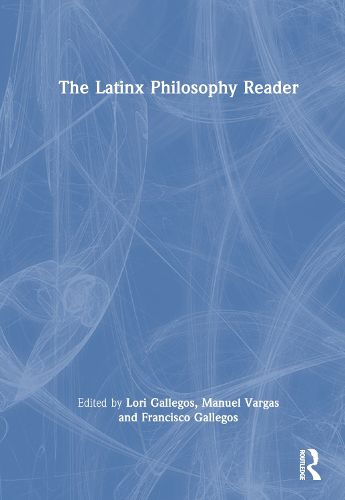Readings Newsletter
Become a Readings Member to make your shopping experience even easier.
Sign in or sign up for free!
You’re not far away from qualifying for FREE standard shipping within Australia
You’ve qualified for FREE standard shipping within Australia
The cart is loading…






The Latinx Philosophy Reader showcases a wide range of significant philosophical works about Latinx people and their experiences, displaying the breadth, distinctiveness, originality, and diversity of Latinx philosophy. Readings include discussions of what it is like to be perceived as undocumented, ethical quagmires affecting those who interpret for their family members, the difficulty of pursuing career success without compromising one's cultural identity and values, the nature of citizenship, disputes about labels, the significance of language, and debates about the nature of Latinx identity.
The editors' detailed introduction orients readers with an overview of the origins of the field of Latinx philosophy, a guide to terminology, and a history of the idea of Latinx identity in the United States. The volume's 35 readings are made up of both widely read and cited articles from journals and books and newly commissioned contributions from the leading voices in the field. All of them are organized into seven thematic units in contemporary Latinx philosophy:
I. Social Identity
II. Mestizaje and Indigeneity
III. Cross-Cultural Challenges
IV. Epistemology, Phenomenology, and Coloniality
V. Language and Communication
VI. Immigration/Citizenship
VII. Metaphilosophy
Each of these seven units includes its own introduction that connects each reading to the overarching themes of the unit and volume.
Throughout, the readings provide an accessible entry point to readers new to philosophy. The texts generate opportunities for philosophical reflection without requiring readers to consult additional resources to grasp the major insights. They can be read in any order, allowing for ready adaptation to the particular interests of instructors and students.
Key Features
? Includes accessible, previously published articles as well as newly commissioned contributions from leading voices in the field
? Foregrounds the explosion of more recent work on Latinx philosophy, while also including essential classic texts
? Provides a general introduction that contextualizes Latinx philosophy and explains its distinct and broader importance
? Includes seven smaller unit introductions that describe the importance and relevance of each reading in the unit
? Highlights a diversity of latinidades, or ways of being Latinx, portraying a range of Latinx experiences and concerns
? Provides reading and discussion questions for each chapter
$9.00 standard shipping within Australia
FREE standard shipping within Australia for orders over $100.00
Express & International shipping calculated at checkout
The Latinx Philosophy Reader showcases a wide range of significant philosophical works about Latinx people and their experiences, displaying the breadth, distinctiveness, originality, and diversity of Latinx philosophy. Readings include discussions of what it is like to be perceived as undocumented, ethical quagmires affecting those who interpret for their family members, the difficulty of pursuing career success without compromising one's cultural identity and values, the nature of citizenship, disputes about labels, the significance of language, and debates about the nature of Latinx identity.
The editors' detailed introduction orients readers with an overview of the origins of the field of Latinx philosophy, a guide to terminology, and a history of the idea of Latinx identity in the United States. The volume's 35 readings are made up of both widely read and cited articles from journals and books and newly commissioned contributions from the leading voices in the field. All of them are organized into seven thematic units in contemporary Latinx philosophy:
I. Social Identity
II. Mestizaje and Indigeneity
III. Cross-Cultural Challenges
IV. Epistemology, Phenomenology, and Coloniality
V. Language and Communication
VI. Immigration/Citizenship
VII. Metaphilosophy
Each of these seven units includes its own introduction that connects each reading to the overarching themes of the unit and volume.
Throughout, the readings provide an accessible entry point to readers new to philosophy. The texts generate opportunities for philosophical reflection without requiring readers to consult additional resources to grasp the major insights. They can be read in any order, allowing for ready adaptation to the particular interests of instructors and students.
Key Features
? Includes accessible, previously published articles as well as newly commissioned contributions from leading voices in the field
? Foregrounds the explosion of more recent work on Latinx philosophy, while also including essential classic texts
? Provides a general introduction that contextualizes Latinx philosophy and explains its distinct and broader importance
? Includes seven smaller unit introductions that describe the importance and relevance of each reading in the unit
? Highlights a diversity of latinidades, or ways of being Latinx, portraying a range of Latinx experiences and concerns
? Provides reading and discussion questions for each chapter